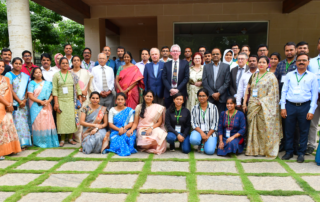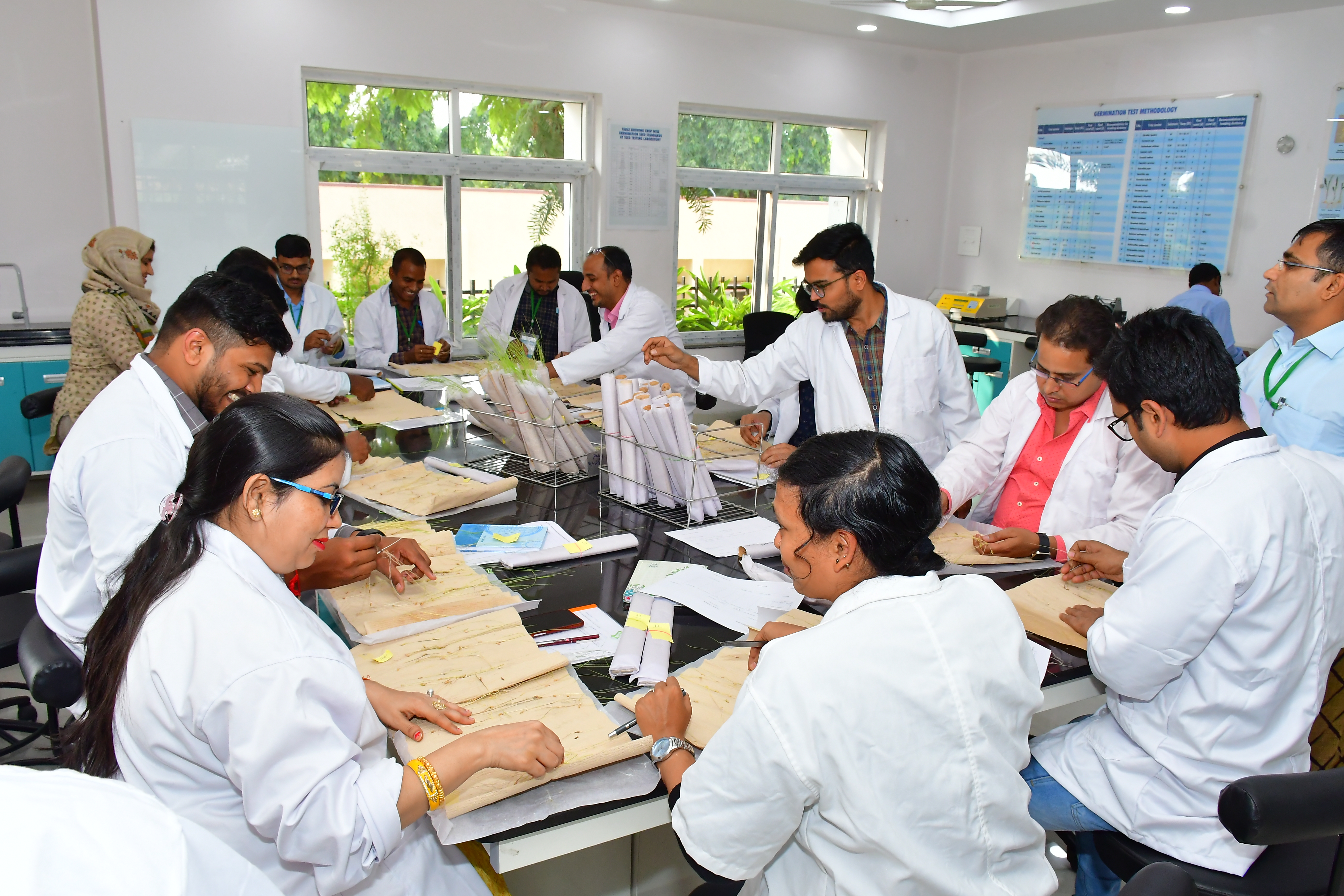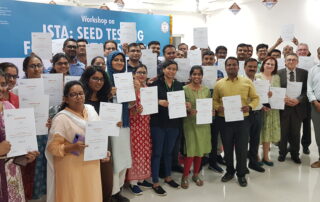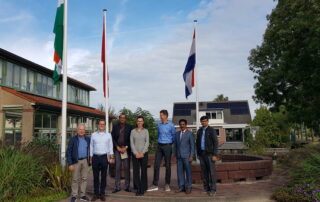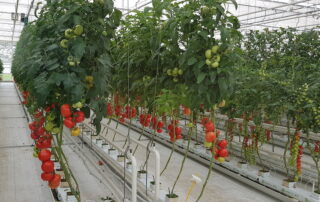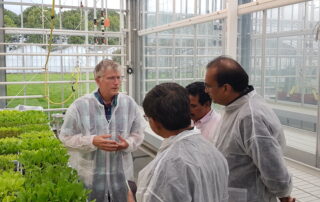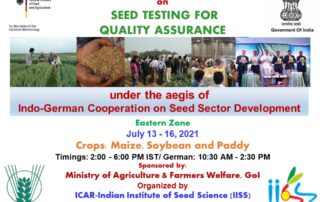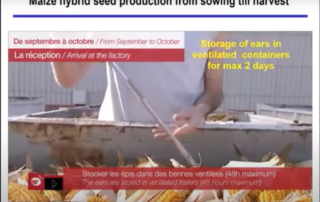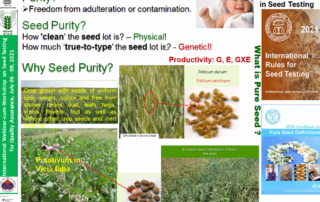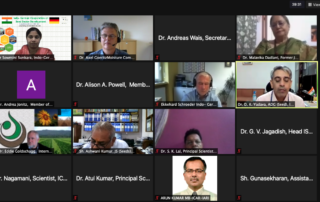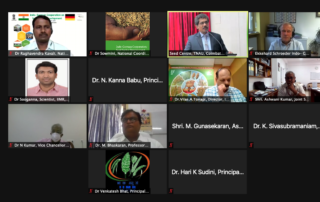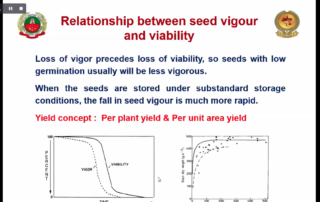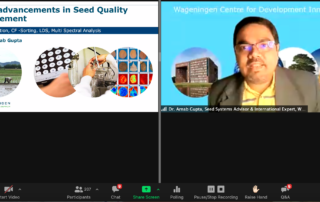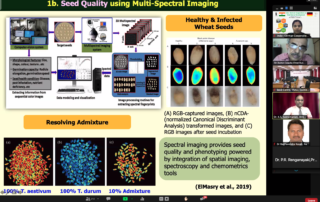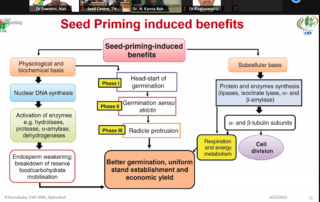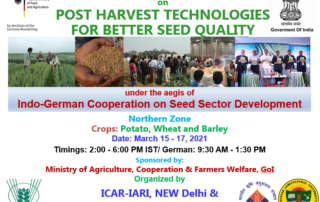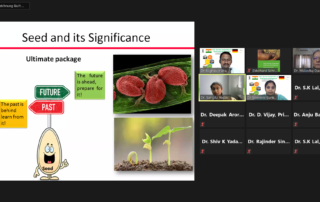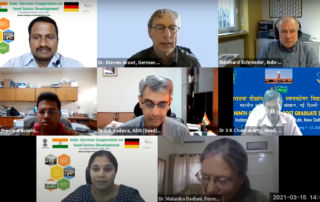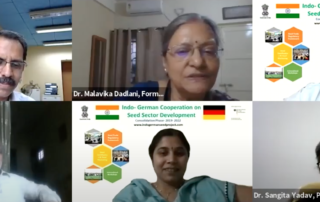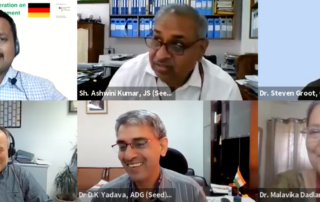News Archive
Workshop on ISTA: Seed Testing Quality Assurance in October 2023 in Hyderabad
During October 15 – 19, 2023, a 5-day Workshop on “Seed Testing for Quality Assurance” has been successfully implemented under the aegis of the Indo-German Bilateral Cooperation on Seed Sector Development and the International Seed Testing Association (ISTA) in cooperation with the ICAR-Indian Institute of Millet Research (IIMR) and Telangana International Seed Testing Authority (TISTA) in Hyderabad. The 5-day technical programme covered two main areas:
- Part 1: Quality Assurance & ISTA Accreditation
- Part 2: Technical & Practical Aspects on Moisture, Germination and Physical Purity Testing
24 participants of public and private Seed Testing Laboratories (STLs) of India attended the training programme. Most of the participants have been quality managers of ISTA member labs in India which intend ISTA accreditation.
With Dr. Keshavulu (India), President of ISTA and Director Telangana State Seed & Organic Certification Authority (TSSOCA), Dr. Craig R. McGill (New Zealand) and Dr. Joël Léchappé (France), former Presidents of ISTA and Technical Auditors of ISTA, Dr. Florina Palada, Head of ISTA Accreditation & Technical Department (Switzerland), Dr. G.V. Jagadish, former head and advisor of the ISTA accredited seed laboratory of Indo-American Seeds in Bengaluru and Dr. Malavika Dadlani, former President of the Indian Society of Seed Technology and member of the ISTA Vigour Committee, an outstanding team of international and national trainers supported the workshop. The workshop was organized in the new ISTA accredited seed testing lab of TISTA in Hyderabad. TISTA provided excellent conditions & support for practical demonstration & exercises on moisture, germination and physical purity testing. ISTA Accreditation verifies whether a laboratory is technically competent to carry out seed testing procedures in accordance with the ISTA International Rules for Seed Testing. Accredited laboratories must run a quality assurance system, fulfilling the requirements of the ISTA accreditation standard. In some countries/distinct economies of the world, the import of seed is only permitted if the seed lot is accompanied by an ISTA Certificate www.seedtest.org/en/accreditation/accreditation-benefits-1109.html .
The Indo-German seed project is part of the bilateral cooperation programme of the German Ministry of Food and Agriculture (BMEL). The consortium charged with conducting this bilateral project consists in Germany of ADT Project Consulting GmbH (ADT), the Sortenförderungsgesellschaft mbH (SFG) and the German Plant Breeders’ Association (BDP).
Study visit & consultation meeting on DUS testing on Tomato to the Netherlands in September 2023
In the frame of the project “Indo-German Cooperation on Seed Sector Development”, funded by the German Ministry of Food and Agriculture (BMEL), a study visit of 3 expert of India on distinctiveness, uniqueness and stability (DUS) testing of Tomato in Greenhouse to Naktuinbouw (the Netherlands Inspection Service for Horticulture) in Roelofarendsveen has been organized during September 25 – 30, 2023.
Participants have been the Registrar General of the Protection of Plant Varieties and Farmers’ Rights Authority (PPV&FRA) in New-Delhi and two Indian Scientists responsible for the execution of DUS-testing on tomato at the DUS testing Centres for Horticulture in Bangalore (ICAR-IIHR) and Varanasi (IIVR).
The programme included 3 days training and consultations at Naktuinbouw in Roelofarendsveen on various topics related to DUS testing on tomato and practical training & demonstration & exercises in greenhouses. In addition, some vegetable and ornamental breeding companies have been visited in the Netherlands.
The Indo-German seed project is part of the bilateral cooperation programme of BMEL. The consortium charged with conducting this bilateral project consists of ADT Project Consulting GmbH (ADT), the Sortenförderungsgesellschaft mbH (SFG) and the German Plant Breeders’ Association (BDP).
More information about the project you can find under https://www.indogermanseedproject.com
International Webinar on Seed Testing for Quality Assurance with Participants of the Eastern Zone of India
In the frame of the Indo-German Project on Seed Sector Development a further four-day International Webinar on “Seed Testing for Quality Assurance” was successfully conducted with more than 75 participants of the Eastern Zone of India from July 13th – 16th, 2021 in cooperation with DAC&FW, Ministry of Agriculture and Farmers Welfare, Govt. of India and the ICAR- Indian Institute of Seed Science (IISS) in Mau, India. The aim of this webinar was to present and discuss basic principles, methods and rules on seed sampling and testing with reference to the internationally agreed rules and methods of the International Seed Testing Association (ISTA) www.seedtest.org/en/home.html.
More than 75 Officials from Seed Department of DAC & FW, MOA, GOI, Officials of State Department of Agriculture, representatives of Seed Production in National Seed Corporation, State Seed Corporation, representatives of private and public Seed Testing Laboratories (STLs), senior scientists from ICAR institutes, professors from SAU’s etc. have attended the webinar & participated in active discussions. Dr. Sanjeev Kumar, Director, IISS, Mau has given opening remarks on the first day. Dr. DK Yadava (ADG Seeds) has given a lecture on Concept of Seed Quality and Importance of Seed Testing for Quality Assurance. Dr. Andreas Wais (Secretary General, ISTA) presented a lecture on International Rules for Seed Testing. Experts from Germany like Prof. Dr. Michael Kruse (University of Hohenheim), Dr. Andreas Jonitz (Head of ISTA accredited Seed Lab LTZ Augustenberg/Germany), Dr. Axel Goeritz (Head of ISTA accredited Seed Lab LUFA Nord-West/Germany) and Ms Christine Herzog (ISTA Technical and System Auditor) provided presentations and shared their experience. Several Indian experts from public and private sector like Dr. G.V. Jagadish of Indo American Hybrid Seeds Company in Bangaluru contributed with excellent presentations to the success of the webinar. Eminent scientists & subject experts like Dr. Malavika Dadlani, Dr. M. Bhaskaran and Dr. S. Rajendra Prasad have chaired the four-day webinar for the general discussions and questions & answers session.
Along with external experts, Dr. Arvind Nath Singh (Principal Scientist, ICAR-IISS), Dr Sripathy (Scientist, ICAR-IISS), Dr. Uday Bhaskar (Sr. Scientist, ICAR- IISS), Dr. Somu Gupta (Scientist, ICAR-IISS) and Dr. Vinesh Banoth (Scientist, ICAR-IISS) as well as Mr. Ekkehard Schroeder (Team Lead, Indo-German Project), Dr. Sowmini Sunkara & Dr. Raghavendra Kavali (National Project Coordinators, Indo-German Project) supported the successful organisation of the webinar.
A team of well experienced national and international experts/trainers from public and private sector covered various topics which include:
- Concept of seed quality and importance of seed testing in quality assurance;
- National and International Scenario- Seed Quality Assurance Regime;
- International rules for Seed Testing according to ISTA – Overview;
- Seed Quality Assurance in GM Crops;
- Seed Sampling: An Overview;
- Physical Purity Analysis of Seed Lots: An Overview;
- Seed Moisture Estimation: Concepts and Methodology;
- Other Seed Determination: Emphasis on Weed Seed Identification;
- Detection of Insect Infestation in Seeds;
- Elucidation on Seed Germination Testing & Seedling Evaluation;
- Seed Viability Testing: Standard Operating Protocols;
- Seed Moisture Testing and Calibration of Seed Moisture Testing Equipment;
- Introduction to Seed Vigour Testing Methods and Setting up of Electrical Conductivity Test in Soybean;
- Genetic Purity Testing: Objectives, Principles and Methods;
- Heterogeneity Testing and Deliberations on Tolerance Limits in Seed Testing;
- Maintenance of Laboratory Equipment, Development of Visual Aids and Storage of Guard Samples in Seed Testing Laboratories;
- Principles of Seed Health Testing;
- ISTA Accreditation of Seed Testing Laboratory;
- Comprehensive Outlook on Seed Legislations and Regulations;
- Handling of samples, coding and maintenance of records in seed testing laboratory;
- ISTA Certificates and Rules for its Issuance.
The webinar provided useful information and discussions on the internationally agreed standard procedures & rules for sampling and testing of seeds for quality assurance on various specific areas. In addition, information on ISTA accreditation of seed testing laboratories and how to prepare for attaining and maintaining ISTA accreditation was provided.
International Webinar on Seed Testing for Quality Assurance – Northern Zone of India
In the frame of the Indo-German Project on Seed Sector Development a four-day International Webinar on “Seed Testing for Quality Assurance” was successfully conducted with more than 150 participants of the Northern Zone of India from July 6th – 9th, 2021 in cooperation with DAC&FW, Ministry of Agriculture and Farmers Welfare, Govt. of India and the ICAR–Indian Agricultural Research Institute in New Delhi.
The aim of this webinar was to present and discuss basic principles, methods and rules on seed sampling and testing with reference to the internationally agreed rules and methods of the International Seed Testing Association (ISTA) www.seedtest.org/en/home.html.
A Seed Testing Laboratory (STL) is the hub of seed quality control. Seed testing is required to assess the seed quality attributes of the seed lots which have to be offered for sale. These quality attributes are particularly physical and genetic purity, seed moisture content, germination and vigour, viability, freedom from seed borne diseases and insect infestation. This information is also needed for labeling and marketing / export purposes.
More than 150 Officials from Seed Department of DAC & FW, MOA, GOI, Officials of State Department of Agriculture, National Seed Corporation, State Seed Corporation, Private Seed Industry Associations (NSAI & FSII), ICAR institutes, SAU’s etc. have attended this webinar & participated in active discussions.
Dr. Ashwani Kumar, Joint Secretary Seeds at DAC&FW has given opening remarks on the first day, Dr. DK Yadavav (ADG Seeds) as zonal coordinator given a lecture on Importance of Seed Testing, Dr. Andreas Wais (Secretary General, ISTA) presented a lecture on International rules for Seed Testing and eminent scientists & subject experts from India, Germany and other countries (often members of ISTA Technical Committees) have chaired and co-chaired the four-day webinar for the general discussions and questions & answers sessions. Along with external experts, Dr. SK Chakrabarty (Head SST, ICAR-IARI), Dr. Sandeep Lal (Principal Scientist, ICAR-IARI), Dr. Shiv K Yadav (Principal Scientist, ICAR- IARI) and other staff of ICAR-IARI as well as Mr. Ekkehard Schroeder (Team Lead, Indo-German Project), Dr. Sowmini Sunkara & Dr. Raghavendra Kavali (National Project Coordinators, Indo-German Project) supported and attended the webinar.
A team of well experienced national and international experts/trainers from public and private sector covered various topics which include:
- Importance of seed testing in quality assurance system;
- Seed Testing Laboratory: Establishment and management;
- International rules for Seed Testing according to ISTA – Overview;
- Seed Sampling: Principles and procedures;
- Seed moisture testing and calibration of seed moisture testing equipment;
- Seed mixture analysis and weed seed identification;
- Physical purity testing: Principles and procedures;
- Thousand seed weight determination and testing seeds by weighted replicates for field planting value;
- Determination of seeds for Other Distinguishable Varieties (ODVs);
- Variety purity testing using morphological traits with special reference to potato, barley and wheat;
- Seed health testing: Principles and procedures;
- Detection of seed transmitted bacteria and viruses;
- Seed vigour testing: Principles and procedures;
- Seed germination testing: methods, special treatments, categories of seedlings in different crops;
- Testing of coated seeds;
- Biochemical tests for seed viability and genetic purity;
- Genetic purity: DNA based testing including genetically modified seeds;
- Calibration of different seed testing equipment- Frequency, precautions, record maintenance and pre- requisite for quality audit compliance;
- ISTA Certificates and Rules for its Issuance.
In addition, information on ISTA accreditation of seed testing laboratories and how to prepare for attaining and maintaining ISTA accreditation was provided.
International Webinar on Seed Quality Enhancement
In the frame of the Indo-German Project on Seed Sector Development an International Webinar on “Capacity Building on Seed Quality Enhancement – Southern Zone” was successfully conducted from June 23rd to 25th, 2021 in cooperation with DAC&FW, Ministry of Agriculture and Farmers Welfare, Govt. of India & Indian, the ICAR– Indian Institute of Millet Research (IIMR) in Hyderabad, Telangana and the Tamil Nadu Agriculture University (TNAU) in Coimbatore, Tamil Nadu, India. During this capacity building program, the most important seed crops of the Southern Zone were selected i.e., Sorghum, Pearlmillet and Groundnut.
The aim of this webinar was to exchange knowledge & experiences & views between experts of India and Germany/ EU on various technologies and advanced methodologies involved in seed quality enhancement.
More than 250 Officials from Seed Department of DAC & FW, MOA, GOI, Officials of State Department of Agriculture, representatives of Seed Production in National Seed Corporation, State Seed Corporation, representatives of the private seed industry associations (NSAI & FSII), senior scientists from ICAR institutes, professors from SAU’s etc. have attended this webinar & participated in active discussions.
Key organizers have been the ICAR- Indian Institute of Millet Research (IIMR), Hyderabad, Telangana, Tamil Nadu Agriculture University (TNAU), Coimbatore, Tamil Nadu, India and Govt. of India, Ministry of Agriculture & Farmers Welfare, DAC& FW in Delhi. In addition, Mr Ekkehard Schroeder (German Team Leader), Dr Sowmini Sunkara & Dr Raghavendra Kavali (National Project Coordinators, Indo- German Cooperation on Seed sector project) supported the preparation and implementation of the webinar.
Dr. Vilas Tonapi (Director, IIMR) as coordinator of the Southern project zone has given opening remarks. Dr. KS Subramanian (Director of Research, TNAU, Coimbatore) has given special address of the webinar, Dr. N. Kumar (Vice – Chancellor, TNAU, Coimbatore) has given presidential address on the first day. Dr. KS Subramanian (Director of Research, TNAU, Coimbatore) chaired the first day sessions, Prof. Rame Gowda (ICAR Emeritus Scientist Former Associate Director of Research, UAS, GKVK, Bangalore), chaired the second day sessions and Dr. Vilas Tonapi (Director, IIMR), chaired the third day sessions including the general discussions and question & answers part. Along with external experts, Dr. S. Sundareswaran (Director, Seed Centre, TNAU, Coimbatore), Dr. Sooganna (Scientist, IIMR), Dr. Venkatesh Bhat (Scientist, IIMR), Dr. R Jerlin (Prof. SST, TNAU), Dr Raja (Prof. TNAU) and other staff of TNAU also attended and supported the webinar.
A team of well experienced national and international experts/trainers from public and private sector covered various topics which include:
- Latest advancements in Seed Quality Enhancement;
- Trends in seed coating and pelleting;
- Seed quality enhancement in groundnut;
- Seed quality – An Overview;
- Seed quality regulation in India;
- Importance of post-harvest technologies in maintaining seed quality;
- Seed quality in relation to dormancy and germination;
- Post-harvest techniques for seed quality improvement;
- Concept of seed vigour and vigour determination;
- Seed quality enhancement through physical seed treatments;
- Application of nanotechnology and artificial intelligence in seed quality enhancement;
- Causes and effects of seed senescence / deterioration;
- Concept of seed priming and its applications;
- Advances in seed health management;
- Importance and measure of seed quality.
All speakers from India and Germany/ EU provided excellent presentations and information on the topics above. Many other participants actively participated and contributed to fruitful discussions during Q & A Sessions on all the three days.
Dr. Vilas Tonapi (Director, IIMR) joined the webinar during the concluding session again and congratulated everyone for the successful implementation of the webinar which was organized under the aegis of the Indo- German Cooperation on Seed Sector Development.
International Webinar on Post-harvest Technologies for Better Seed Quality
A three-day webinar on “Post-harvest Technologies for Better Seed Quality” with regional focus on Northern Zone of India was successfully conducted during March 15th – 17th, 2021 (4 hours per day) in cooperation with
- DAC&FW, Ministry of Agriculture and Farmers Welfare, Govt. of India;
- ICAR-Indian Agricultural Research Institute Regional Station, Karnal, Haryana; and
- Punjab Agricultural University, Ludhiana, India.
The capacity building measure was focused on most important seed crops of the Northern Zone, i.e. potato, wheat & barley.
More than 50 Officials from Seed Department of DAC & FW, MOA, GOI, Officials of State Department of Agriculture, National Seed Corporation, State Seed Corporation, Private Seed Industry associations (NSAI & FSII), ICAR institutes, SAU’s etc. have attended this webinar & participated in active discussions.
The webinar was opened with welcome remarks of Dr D K Yadava (ADG Seeds). Dr Steven Groot (International expert of Wageningen University), Dr Malavika Dadlani (Former JD-R) and Dr S. K. Chakrabarty (Head, ICAR-IARI) chaired the sessions during the three days. Along with external experts, Dr Sandeep Lal (Principal Scientist, ICAR-IARI), Dr Ashwini Kumar (Principal Scientist, ICAR- IARI, Karnal), Dr Rajinder Singh (Director Seeds – PAU) and other staff of ICAR-IARI also attended the webinar.
The following topics have been covered during the three days:
- Seed development and maturation in relevance to seed quality;
- Seed storage and deterioration: An overview;
- Components, factors influencing seed quality and its maintenance during post-harvest handling: An overview;
- Maintenance of seed quality during seed production;
- Principles of seed drying, storage and packaging: its role in seed quality control;
- Seed processing and post-harvest handling with special reference to potato, wheat and barley;
- Biochemical changes during seed storage and their management with special reference to potato, wheat and barley;
- Potato seed drying, storage and packaging methods;
- Safe seed packaging technologies in potato, wheat and barley;
- Integrated pest management for seed storage with special reference to potato, wheat and barley;
- Seed health management for better seed quality of potato, wheat and barley;
- On-farm seed storage in wheat.
In addition, Mr Ekkehard Schroeder (German Team Leader), Dr Sowmini Sunkara & Dr Raghavendra Kavali (National Project Coordinators, Indo-German Cooperation on Seed Sector Project) also participated and supported the organization of the webinar.
All speakers of the webinar prepared excellent presentations which have been distributed subsequently to the participants.
